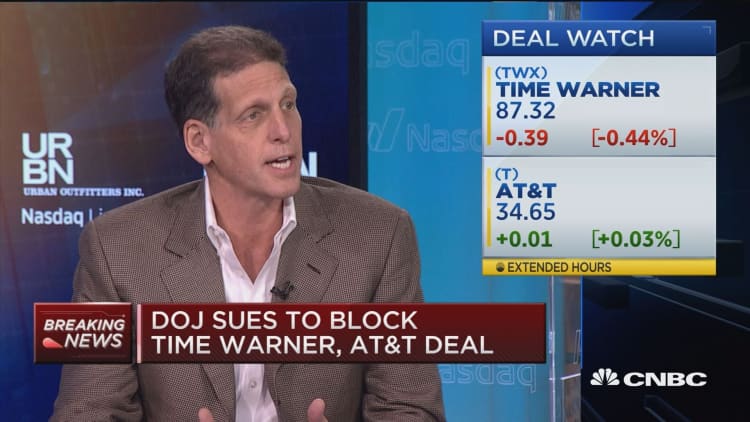
As the Department of Justice goes after the AT&T-Time Warner merger, it has the odds in its favor, antitrust attorney David Goodfriend told CNBC on Monday.
The DOJ sued on Monday to block AT&T's $85 billion deal to buy Time Warner, calling it an "illegal" combination that harms consumers and stifles innovation.
Goodfriend said 29 of the last 30 times the Justice Department has brought this kind of injunctive claim, it has won the case.
"If you go on those odds, they wouldn't be bringing this case if they didn't feel pretty confident that they could prevail," he said in an interview with "Closing Bell."
In a statement on Monday, AT&T's general counsel, David McAtee, called the lawsuit a "radical and inexplicable departure from decades of antitrust precedent."
"Vertical mergers like this one are routinely approved because they benefit consumers without removing any competitor from the market. We see no legitimate reason for our merger to be treated differently," he said.

Craig Moffett, senior analyst and founder of MoffettNathanson, said the DOJ doesn't like the behavioral remedies" that have been used in the past in so-called vertical mergers because it effectively has to make them be regulators.
Vertical mergers are when two companies in separate positions in the same supply chain combine, in this case, content (Time Warner) and media distribution (AT&T).
A Justice Department official told reporters on Monday that the merger would raise prices for consumers and potentially block creators of media content from distributing their product without paying more money.
Moffett said about 70 percent of the country consumes Time Warner content through some platform other than A&T.
"As long as AT&T now becomes a supplier to its direct competitors, it has an incentive to raise the price to its direct competitors and that raises the price to those consumers. That's the argument," he said in an interview with "Fast Money."
Elephant in the room
Meanwhile, the elephant in the room is whether the Justice Department is acting more on politics than policy, Goodfriend said.
President Donald Trump has had an adversarial relationship with CNN, which is owned by Time Warner. The president has repeatedly called it "fake news."
Goodfriend said if the DOJ doesn't go after the Sinclair Broadcasting acquisition of Tribune Media, then it will be clear that politics was involved.
"If they go after that one with as much gusto as they've gone after this one, then I think we know we've got a new cop on the beat and they're serious about anti-trust enforcement," he said.
— CNBC's John Melloy, Fred Imbert and Liz Moyer contributed to this report.


